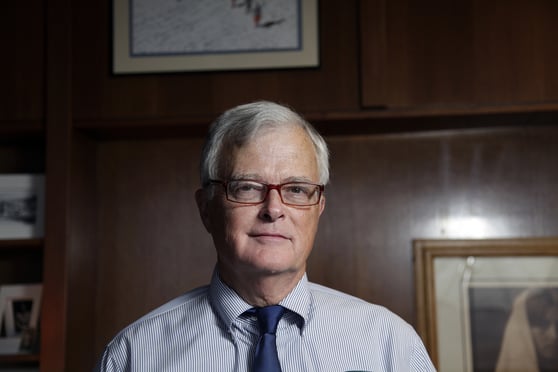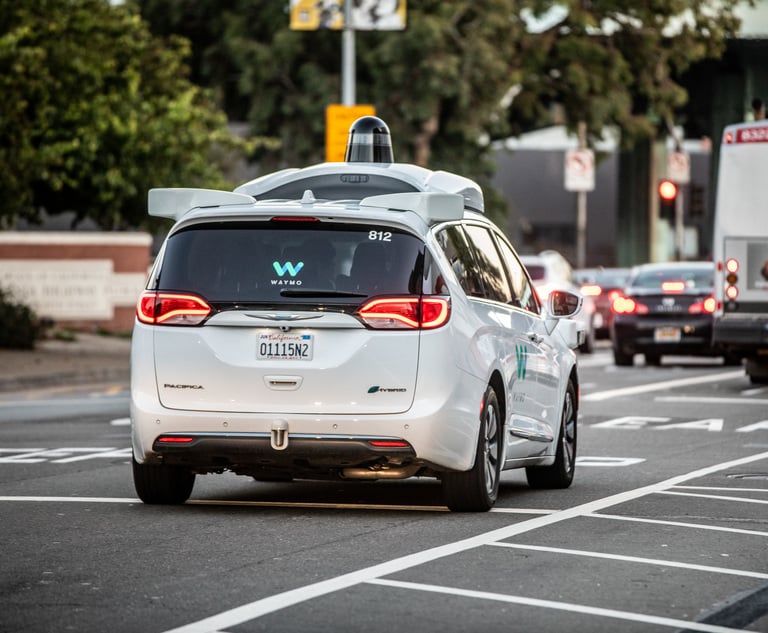Waymo Case Against Uber May See Second Trial Over Software Code
The judge postponed a ruling on Waymo's motion to add two new software-related trade secrets, saying he would decide the matter after the first trial concludes.
October 26, 2017 at 02:33 PM
3 minute read

SAN FRANCISCO — Waymo's lawsuit against Uber over autonomous vehicle technology may go into a second round focused on new claims that Uber is ripping off software code trade secrets, a judge said Thursday.
U.S. District Judge William Alsup of the Northern District of California postponed a ruling on Waymo's motion to add the two new software-related trade secrets, saying he would decide the matter after the first trial concludes in December or January. After that, there may be “trial number two,” he said at a hearing.
Alsup said introducing the software claims at this stage would complicate plans to keep the current trial schedule, which has already been pushed back once. Jury selection in the trial starts on Nov. 29, with opening statements currently set for Dec. 4.
The case as it stands is “not as clean a case as the plaintiffs would've wanted, but it is a triable case,” the judge said. Waymo “ought to get in there and put up or shut up,” he added.
Until earlier this week, Waymo's case focused almost exclusively on claims that Uber is using designs stolen from Waymo for LiDAR hardware, the system that allows autonomous vehicles to “see” their environment.
On Monday, the company sought to add two new trade secrets related to “planner software” that helps interpret the car's sensor data and determine the vehicle's trajectory. It appeared to be the first time Waymo publicly accused Uber of using specific software-based trade secrets.
Charles Verhoeven of Quinn Emanuel Urquhart & Sullivan, Waymo's lead lawyer in the case, said at the hearing Thursday that the software trade secrets are currently being used by Waymo and that Uber has so far not denied it is using them. Waymo alleges the software designs were taken to Uber by Don Burnette, a former Waymo engineer.
Michael Jacobs of Morrison & Foerster—one of the three law firms representing Uber in the case—said Waymo has claimed the trade secrets are worth “6–10 percent of the value of self-driving” technology. Waymo in a filing called them “highly valuable.”
Jacobs argued Waymo should not be able to bring the new trade secret claims into the case at all, saying the law requires plaintiffs to define their asserted trade secrets at the outset of their case, not midway through. “You're not supposed to be able to rummage around,” he said.
Verhoeven shot back that Waymo only had reason to believe the trade secrets were taken because of newly obtained documents from Stroz Friedberg. The digital forensics firm conducted a due diligence report on a number of former Waymo employees, including Burnette, before Uber acquired a company that they started called Ottomotto.
“These arguments are like 'truth is falseness,'” Verhoeven said, after Jacobs accused Waymo of rummaging through the files to try and find a trade secret that would salvage its case. “I'm sorry, I know I have a hot head, but that's just not what's going on,” Verhoeven added.
Alsup—who has familiarity with computer programming languages himself and presided over both phases of the Oracle v. Google trial—emphasized that if there is a second trial that delves into software, the presentation of the evidence could be a challenge.
“When we get into code, it's going to be harder and harder for the jury to get its hands around the case,” he said.
This content has been archived. It is available through our partners, LexisNexis® and Bloomberg Law.
To view this content, please continue to their sites.
Not a Lexis Subscriber?
Subscribe Now
Not a Bloomberg Law Subscriber?
Subscribe Now
NOT FOR REPRINT
© 2025 ALM Global, LLC, All Rights Reserved. Request academic re-use from www.copyright.com. All other uses, submit a request to [email protected]. For more information visit Asset & Logo Licensing.
You Might Like
View All

Shareholder Democracy? The Chatter Musk’s Tesla Pay Case Is Spurring Between Lawyers and Clients
6 minute read
Willkie Farr & Gallagher Drives Legal Challenge for Uber Against State's Rideshare Laws
5 minute read
Trending Stories
- 1States Accuse Trump of Thwarting Court's Funding Restoration Order
- 2Microsoft Becomes Latest Tech Company to Face Claims of Stealing Marketing Commissions From Influencers
- 3Coral Gables Attorney Busted for Stalking Lawyer
- 4Trump's DOJ Delays Releasing Jan. 6 FBI Agents List Under Consent Order
- 5Securities Report Says That 2024 Settlements Passed a Total of $5.2B
Who Got The Work
J. Brugh Lower of Gibbons has entered an appearance for industrial equipment supplier Devco Corporation in a pending trademark infringement lawsuit. The suit, accusing the defendant of selling knock-off Graco products, was filed Dec. 18 in New Jersey District Court by Rivkin Radler on behalf of Graco Inc. and Graco Minnesota. The case, assigned to U.S. District Judge Zahid N. Quraishi, is 3:24-cv-11294, Graco Inc. et al v. Devco Corporation.
Who Got The Work
Rebecca Maller-Stein and Kent A. Yalowitz of Arnold & Porter Kaye Scholer have entered their appearances for Hanaco Venture Capital and its executives, Lior Prosor and David Frankel, in a pending securities lawsuit. The action, filed on Dec. 24 in New York Southern District Court by Zell, Aron & Co. on behalf of Goldeneye Advisors, accuses the defendants of negligently and fraudulently managing the plaintiff's $1 million investment. The case, assigned to U.S. District Judge Vernon S. Broderick, is 1:24-cv-09918, Goldeneye Advisors, LLC v. Hanaco Venture Capital, Ltd. et al.
Who Got The Work
Attorneys from A&O Shearman has stepped in as defense counsel for Toronto-Dominion Bank and other defendants in a pending securities class action. The suit, filed Dec. 11 in New York Southern District Court by Bleichmar Fonti & Auld, accuses the defendants of concealing the bank's 'pervasive' deficiencies in regards to its compliance with the Bank Secrecy Act and the quality of its anti-money laundering controls. The case, assigned to U.S. District Judge Arun Subramanian, is 1:24-cv-09445, Gonzalez v. The Toronto-Dominion Bank et al.
Who Got The Work
Crown Castle International, a Pennsylvania company providing shared communications infrastructure, has turned to Luke D. Wolf of Gordon Rees Scully Mansukhani to fend off a pending breach-of-contract lawsuit. The court action, filed Nov. 25 in Michigan Eastern District Court by Hooper Hathaway PC on behalf of The Town Residences LLC, accuses Crown Castle of failing to transfer approximately $30,000 in utility payments from T-Mobile in breach of a roof-top lease and assignment agreement. The case, assigned to U.S. District Judge Susan K. Declercq, is 2:24-cv-13131, The Town Residences LLC v. T-Mobile US, Inc. et al.
Who Got The Work
Wilfred P. Coronato and Daniel M. Schwartz of McCarter & English have stepped in as defense counsel to Electrolux Home Products Inc. in a pending product liability lawsuit. The court action, filed Nov. 26 in New York Eastern District Court by Poulos Lopiccolo PC and Nagel Rice LLP on behalf of David Stern, alleges that the defendant's refrigerators’ drawers and shelving repeatedly break and fall apart within months after purchase. The case, assigned to U.S. District Judge Joan M. Azrack, is 2:24-cv-08204, Stern v. Electrolux Home Products, Inc.
Featured Firms
Law Offices of Gary Martin Hays & Associates, P.C.
(470) 294-1674
Law Offices of Mark E. Salomone
(857) 444-6468
Smith & Hassler
(713) 739-1250






